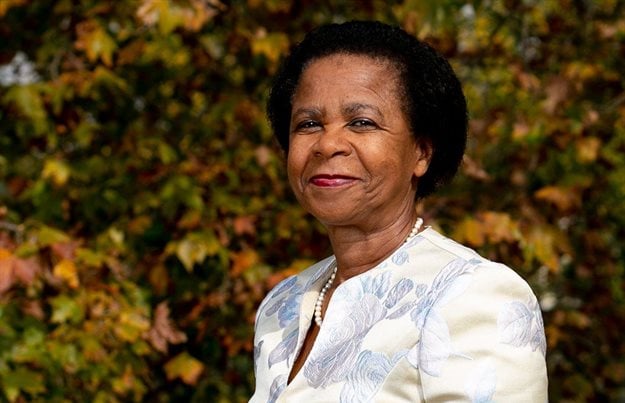It has taken a tiny organism, SARS-CoV-2, to get even the most conservative traditionalists to accept that state institutions are essential to mobilising national resources to protect and promote the common good. The fragilities of neoliberal economics have been laid bare.

Dr Mamphela Ramphele is co-founder of ReimagineSA and co-president of the Club of Rome.
Institutional capacity in public healthcare systems, law enforcement and regulatory agencies, as well as the capacity of the state to commandeer production of essential goods and services, have become decisive interventions in this pandemic. British Prime Minister Boris Johnson, whose conservative government had for years underfunded the public sector, confirmed this unequivocally when he thanked the National Health Service (NHS) for saving his life after he was hospitalised with the coronavirus.
Admirable collaboration
We have President Cyril Ramaphosa to thank for his leadership in mobilising national, continental and global public and private resources to enhance our capacity to tackle this pandemic. The admirable collaboration between public and private healthcare institutions has laid an important foundation for a well-resourced and -run National Health Insurance (NHI) system. We can learn from Britain’s NHS about what works and what doesn’t, so we can build our NHI on a firmer footing.
There is no wisdom in hankering after the old socio-economic development models that brought us to the multi-layered global crises (climate, health and socio-economic) we face today. Post-pandemic socio-economic restructuring has to go beyond traditional notions of privatising state-owned enterprises and smaller government. The entire global socio-economic system we have relied on has been exposed as fragile and a threat to both rich and poor in our society. No economy can prosper while excluding the energies and talents of the majority of its youthful population, as we have done since 1994.
We need to transform our economic and social relationships to build an inclusive prosperous democracy where wellbeing for all people and the planet are sustainably promoted. Such a system would have to dispense with traditional ideological hangovers of pitting the private and public sectors against each other. We have to leverage the strengths of our very well-developed private sector while broadening its base, recognising that its narrow base is a weakness and a missed opportunity for the entire society.
Noxolo Hlongwane, Trialogue 15 Apr 2020
Innovative enterprises
The future of the global economy lies in innovative enterprises that service the needs of local communities, as well as those of the nation and beyond, in mutually supportive ways. Lessons from China and other successful East Asian countries show how leveraging the strengths of both private and public sectors enabled them to build solid resilient systems able to withstand crises.
Small, medium and microenterprises have struggled to thrive in our society. This is largely because of both legal and institutional biases against them that undermine their access to credit and other essential support. Why should these enterprises be legally permitted to only access no more than a tiny two-and-a-half percent of assets held by major funds, despite being estimated to account for 98.5% of the formal economy and provide 28% of jobs? We need to fundamentally rethink this approach as we restructure our economy and strengthen support for sustainable livelihoods in all local communities across the country.
Luvuyo Madasa 15 Apr 2020
Invaluable opportunity for Africa
The Covid-19 crisis presents an invaluable opportunity for Africa to take advantage of its diaspora and get ahead of yet another round of colonialism in the new world order. The rise of nations leveraging the diaspora and minds of its people is well evidenced by the Jewish in the development of Israel; the Indians, especially the ones in the US, spearheading the technological revolution of India; and the Chinese contributing immensely to the development of the modern China through the ‘Bamboo network’.
Africa’s leaders need not despair nor look too far for African minds committed to developing practical strategic ways to integrate existing progressive policies and to innovate. Young African leaders across the continent are a responsive catalyst ready to be leveraged in the efforts to overcome the global Covid-19 crisis.
Tim Akano, a Nigerian entrepreneur, reflecting on lessons the global lockdown has for Africa, concluded in an online article that African leaders are the only ones who have the obligation to focus on promoting the continent’s interests. Africa needs to harness its comparative advantages – people and natural assets – to shape a future that leapfrogs a traditional linear development model that condemns us to servicing the needs of others in a lopsided global economy.
Sameera Munshi 6 Apr 2020
7 “must-dos” for Africa
I have taken the liberty of modifying the seven points he listed as “must-dos” for Africa to emerge out of this emergency stronger:
- We must strengthen and activate the ACFTA – Africa Continental Free Trade Agreement – and use it as a basis for negotiating with China. Fifty-two countries cannot relate with China on an individual basis and hope to get a fair, equitable deal.
- We need a single currency in Africa (AFRO) – not the West Africa’s ECO which the French have contaminated. The world currency battle will begin after the lockdown as China and Russia are bent on overthrowing the dollar hegemony. What will strengthen Africa’s economy is to have its own currency through which we can trade in one African market.
- The race for the 4th Industrial Revolution is open to all people – including Africans. No country has hegemony yet. African youths are hungry and competent enough to compete with their Chinese and American counterparts provided we make the right investment in infrastructure. The Rwanda-based programme initiated by Prof Neil Turok’s African Institute of Mathematical Sciences (AIMS) is a great base.
- Africa must insist on fair and equitable trade deals (50/50) with China, going forward. The good news is that China’s own experience over the years has demonstrated just how effective this is to build local capacity. China’s monopoly of the global supply chain has caused a huge dis-equilibrium. This does not augur well for peaceful coexistence.
- The African Union (AU) must insist on China writing off Africa’s $145bn debt once the pandemic is under control. This is the only way Africa can breathe! How will Africa come up with $8bn in annual interest after the lockdown? Africa should also take advantage of the IMF/World Bank proposed debt write-off. China borrowed very strategically from the World Bank in the 1990s in order to access technical capacity to sustainably develop its own national priorities. It never begged for aid from the West. Then why should we depend on debt and aid to grow? African leaders should desist from going cap-in-hand looking for aid from Russia, China, America, Japan, India and Brazil. Africa has enough resources to build a modern civilisation for itself.
- According to McKinsey research, the Chinese love to go on vacation abroad and they were projected to spend about $250bn in 2020. African countries should target 50% of China’s tourism spend by building modern amusement and sustainable natural and wildlife parks across the continent, while modernising other infrastructure accordingly.
- Africa’s greatest strength lies in the economic power and technical know-how of Africans in the diaspora. Africa should plan to build six modern cities to accommodate its citizens currently in the diaspora and incentivise them to return home.
South Africa needs to take advantage of our president’s term as chair of the African Union to strengthen our continental links, not as leaders but as partners with other countries to actualise the African Free Trade Agreement.
We need to strategically leverage the unique advantage of Africa – a demographic endowment of a young population of 800 million. Investing in the talents and energies of these young people is essential to building a formidable continental platform of innovation and creative industries, as part of the restructuring of our continental economies for the 21st century in the post-coronavirus era.
This is a moment of great opportunity and we dare not let it slip through our fingers.



























